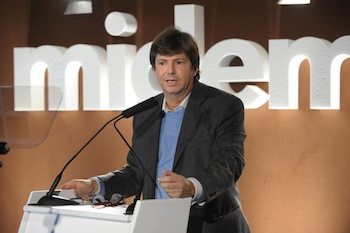

Oliver Francois of Fiat/Chrysler speaks at MIDEM.
MIDEM 2014 opened on Saturday, Feb. 1 in Cannes, France and while Nashville slept—it was 3 a.m. Nashville time when the program began—the music industry reps gathered at MIDEM buzzed about the present and future music business. The themes that emerged on the first day: (1) streaming will play a major role in the future of the music business and (2) companies need music to market their products.
• • •
In the session titled “Back to Growth? Make It Sustainable!” panelists Nicolas Galibert, president of Sony/ATV Music Publishing in France; Alison Wenham, Chairman/CEO of the Association of Independent Music in the UK; and Richard Smirke, Billboard correspondent in the UK; noted that the entertainment industry does not receive credit for what it adds to the economy. Galibert stated that “in terms of creating jobs, opportunities, or contributing to the GNP of a country, music doesn’t get the credit it should receive.” Wenham noted that “the creative industry is a key economic driver” in a nation, in addition to its contributions to the social sphere. Galibert stated that governments should give the creative community “tools not rules” for future growth.
Wenham stated that independent labels have been “crucial to solving the problems brought on by digital” and that “the challenges are huge.” She noted that indies are responsible for 59 percent of the vinyl market and that indie labels “are the natural home for artists who take a long time to develop.” The key to an indie’s success, according to Wenham, is “local but global” where an indie concentrates on breaking an artist in a local market as a foundation for breaking the act globally.
• • •
One of the most interesting Visionary Talks on the first day of MIDEM came from Olivier Francois, CMO and head of the Fiat Brand for the Chrysler group. Francios leads a team that has made extensive use of music in commercials for Chrysler and Fiat. Perhaps the most famous is one with Eminem, initially aired during the Super Bowl, where the singer promotes the city of Detroit as well as the car he’s driving. Francois took over as head of marketing in 2008 during a deep recession. After the Super Bowl ad with Eminem, Chrysler went from selling 600 cars a month to 6,000 cars a month.
Francois likes to combine selling cars with selling the artist and he has used Diddy, L.L. Cool J, Lenny Kravitz, Jennifer Lopez, Pharrell Williams and others which “makes it look like we’re a little ahead of the curve in popular culture.” Francois has a close working relationship with Jimmy Iovine and Republic Records and they work jointly to “make music videos that feature the car.” Francois believes “there’s only one right track for a campaign” and, if that track is not found, “we don’t use music at all.”
• • •
In the seminar “Streaming: A Sustainable Platform for Artists?” panelists included Axel Dauchez, CEO of Deezer; Eddy Maroun, co-founder and CEO of Anghami, a streaming service in Lebanon; Brian Message, Chairman of the management group MMF in the U.K.; Thorsten Schliesche, General Manager of Napster for Europe; Mandar Thakur, COO of Times Music in India; and Milana Rabkin, Digital Media Agent for the United Talent Agency in the United States.
The streaming services have found they must create their own content and not depend on record labels to provide everything. The challenge is “discovery,” presenting listeners with something new. Thorsten Schliesche of Napster noted that “investing in new artists is not a marketing tool, it’s an industry need.” Brian Message said, “the key to the future of streaming is discovery, otherwise it becomes a low margin business.”
A question from the audience was raised about royalty rates paid by streaming services. The services pay a fraction of a penny for each streamed song and Schliesche noted that “75 percent of the revenue goes to the music industry” while the remaining 25 percent is required “to build and run and maintain” the streaming business. “It’s a long term business model,” said Schliesche. “It cannot be a short term solution. In the long run, streaming will make more money for record labels than they will receive from the sales of records.”
“We’re giving more money back to the industry than anyone else,” stated Schliesche, who labeled YouTube “a legal pirate.”
In the digital recording industry, Brian Message noted that amongst managers a chief concern is “to get beyond the non-disclosure agreements and be more transparent” because “artists need to see how revenues are calculated. We need to get to the point where everyone understands the flow of money and trusts and respects each other.”

Category: Featured, Sales/Marketing
About the Author
Don Cusic is Professor of Music Business at Belmont University. He has authored 18 books, including his most recent “Discovering Country Music.”View Author Profile


